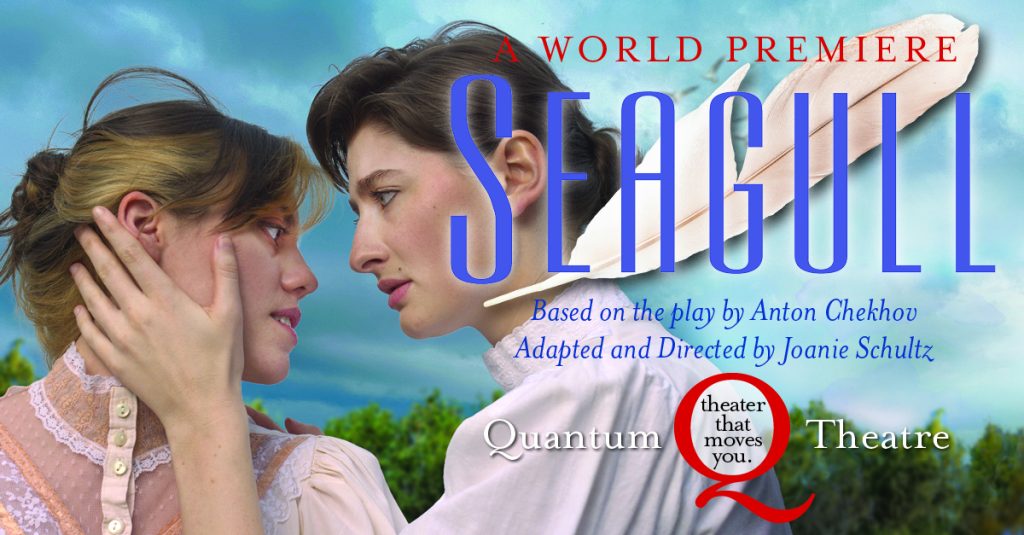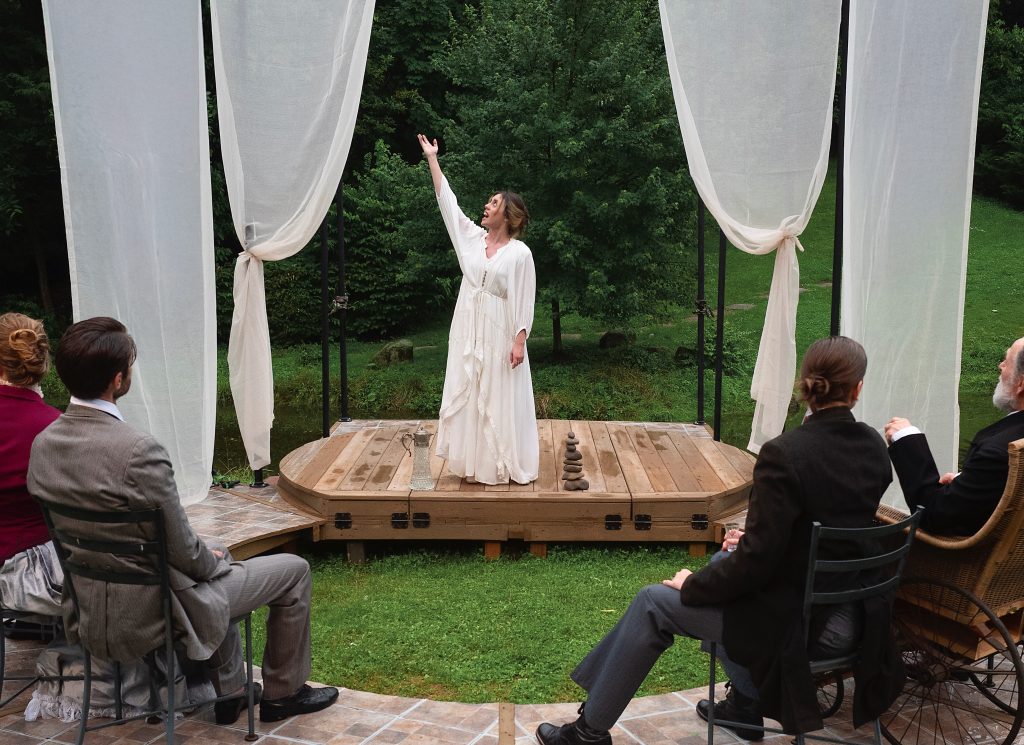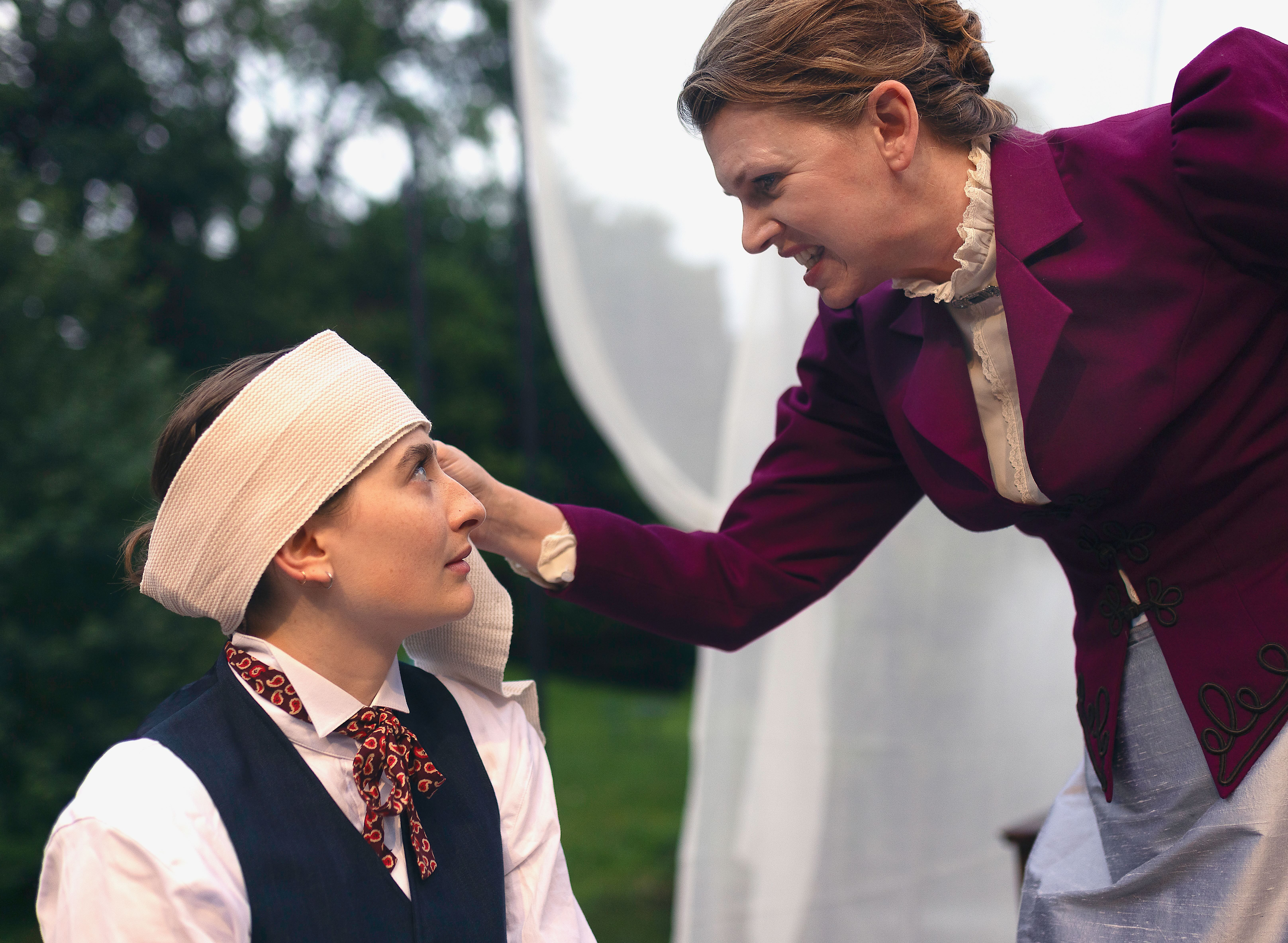Quantum’s ‘Seagull’ Flies an Intriguing Path Through Human Space/Time

Two things to know about Seagull, the new adaptation of Anton Chekhov’s classic, now in its world-premiere run at Quantum Theatre (through August 17). The first is that a play about frustration and despair cannot itself be a buzzkill. Not many theater fans want to pay to have the joie de vivre squeezed out of an evening. Chekhov knew this, it seems. He wrote The Seagull as a comedy—well, a tragicomedy—and the version at Quantum keeps the buzz alive.
The second is that in this version, adapted and directed by theater artist Joanie Schultz, a pivotal role has been gender-swapped. Chekhov’s original gave us Konstantin, a young man who’s an aspiring playwright and is hopelessly in love with his leading lady. Here we have Constantine, an aspiring young female playwright hopelessly in love with her leading lady. The change is significant. It has repercussions that ripple through the play. But it doesn’t sidetrack any of the play’s major themes or dynamics. And in this reviewer’s view, neither is it the main reason to go and see Seagull. See Seagull because it’s good theater.
Let me suggest an analogy. In one of his famous teachings, the Zen master Shunryū Suzuki said that enlightenment is “nothing special.” You won’t be transported to otherworldly realms. You will simply see the “true nature” of this world and yourself in it—nothing special, but more than enough.
Something like this holds true in theater. Special concepts or gimmicks may be used, especially in remakes of old classics and in takeoffs on them. (The Wicked Witch was actually a good witch!) The purpose might be to question the old show’s assumptions, or to inject new relevance or open the door to new interpretations. But the special stuff alone can’t carry a show. Theater only hits home when it performs its simple, basic function well. Which is to give us glimpses into the true nature of the world and ourselves. That is where the magic really lives. It’s more than enough, and I think you will find plenty of it if you let Seagull reel you in.
A Fine Update
Overall, Joanie Schultz’s writing and direction preserve the structure of Chekhov’s play. That is good, since (a) the structure works, and (b) this is an interlocking ensemble piece. Any attempt to shuffle the elements around would risk bringing down the Jenga tower.
Besides, the characters do a fine job of courting catastrophe as it is. They chase—and accept—relationships that are doomed to decay from the start. They know what the right move would be, but either have spent years avoiding it or they screw up the implementation thereof. They are not fools. They have talents; they have assets. They find and express glimmers of love, pure love. Yet they’re always riding undercurrents of their own foibles and follies. Which, combined with those of the people close to them, do not add up to what management gurus call synergy.
What the entire tangle adds up to is a very relatable human comedy-slash-tragedy—despite the fact that the setting remains a country estate in Russia in the 1890s. Dialogue, where appropriate, has been updated to sound contemporary and conversational. (Updated language comes across as natural in period plays, provided it isn’t too modern-slangy.) Staging of Chekhov has evolved over the past century or so, with various tweaks made at various times and places, and there is no need to trace that process except to say that Schultz’s script is a graceful evolution.
Triangles and Tricky Touches
To those who desire a plot summary, I would say: How much time you got? We’re looking at a tangle of love triangles and unrequited loves and aspirations, all playing out absurdly up to points at which they’re no longer laughing matters. Better to just give some hints of the triangulations.
Masha, a moody young woman who’s part of the family managing the country estate, is pursued by a schoolteacher who wants to marry her but is, in her eyes, exhibit A of the crushing boredom of society writ large. Masha has eyes for Constantine, the fiery daughter of a great theater actress inhabiting the estate. Constantine’s passion is fixated on Nina, the daughter of neighboring nobility, who dreams of being a great actress in her own right. (An absurd early scene comes when Nina stars in a one-person play Constantine has written, which dares to break the norms of conventional theater, though rather strangely.)

Meanwhile Constantine has a love-hate relationship—mostly hate—with her mother, the great actress Arkadina, who’s now past her prime but thinks age is just a number: a number to be concealed. Arkadina’s heart belongs to her arm candy, a younger man in his thirties named Trigorin, a popular novelist. But what will happen after Trigorin attends the not-so-hot experimental play, and meets the hot starlet-to-be Nina? Will Nina decide that the lure of a man, a famous and charming man, trumps her woman-to-woman bond with Constantine?
Although there are scenes of stormy confrontation in Seagull, much of the dramatic intrigue—as well as much of the humor—trickles out in small ways and little touches. Aging Arkadina, for example, can’t stop flaunting her diva-hood. When this admittedly attractive but visibly mature woman (acted by Lisa Velten Smith) pirouettes grandly, it’s grating. When she says she can still play a girl of 16, the chuckles begin. Then, as other characters chime in with their delusions or their stuttering missteps, the chuckles continue. At one point on opening night, well into Seagull, I realized that I’d been watching for quite a while in a state of near-constant chuckling. And that all the audience members around me were chuckling to the same beats.
As for little serious touches that hit home, consider Trigorin (acted by Brett Mack). It’s tempting to have this man played as a smarmy predator, leeching off a wealthy older woman while he ensnares a young one who is barely past Epstein age. But here we come to see him as a much more complex character. A man so unsure of himself, despite his fame, that he wobbles between clinging to a mother-figure and pursuing a perceived paragon of fresh beauty. Is that a dangerous combination? Oh yes. And yet, as my theater-going friend observed, Trigorin is like “a spider unaware of the web it’s spinning” and unable to stop. Just as many of us are unaware of ourselves (or only imperfectly aware), and unable to stop being trapped in webs of our own making.

Now here is a final factoid to illustrate how engrossing this play is. At the end, while the audience rose in a standing O, I glanced at my notebook. Normally it is filled with observations I’ve written down and lines of dialogue I’ve rushed to copy. After Seagull it contained exactly two scribbled notes, both unhelpful. (One was a cryptic reference to a character saying “The cloud looked like a piano.”) My point: I had been too immersed in the play to take notes.
Presentation of such a play requires the director, cast, and crew to dance an ongoing balance between chuckles and calamity. Here, the dance was mesmerizing. It swept me away. May you meet the same fate.
Closing Credits and Ticket Info
Joanie Schultz’s Seagull merits credit to all involved in the show. Actor Lisa Velten Smith plays Arkadina with a depth beyond mere grande dame-ery. Brett Mack’s turn as Trigorin has been duly noted. Phoebe Lloyd is incendiary as Constantine. Julia Rocha is a perfect Nina. Maxine Colton won me with her moody Masha, and Evan Vines as Masha’s hapless suitor Medvendenko makes the character as hapless as one could imagine. Also spot-on are Ken Bolden as Arkadina’s elderly brother Sorin, Daniel Krell as the physician Dorn, and Paul Anderson and Gwendolyn Kelso as Masha’s estate-managing parents.
Quantum Theatre produces plays on location, and the location for Seagull enables the play to truly sing. The stage is outdoors at the bottom of a gently sloping ravine, next to the pond on the Chatham University campus. A country estate indeed. The address is 107 Woodland Drive, between Shadyside and Squirrel Hill, and Seagull runs until August 17. Visit Quantum on the web for tickets and further information.
Then, once you’re there, thank Chelsea Warren for the scenic design that makes the location work to the utmost. Lighting is by C. Todd Brown, sound and composition by Ryan McMasters, and costumes by Damian E. Dominguez. James “Cubbie” McCrory is technical director and the stage manager is Cory F. Goddard. Kristi Good served as dramaturg on Seagull. The assistant director is Anya Hilpert. Other contributors are listed in the online program on Quantum’s web. And in the program, be sure to read Joanie Schultz’s personal story of what led her to create this adaptation.
Mike Vargo, an independent writer based in Pittsburgh, writes about theater and the visual arts for Entertainment Central.
Share on Social Media
Follow Entertainment Central
Latest Stories
Sign up for the EC Newsletter







